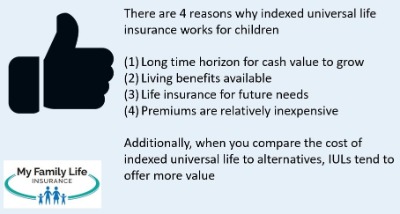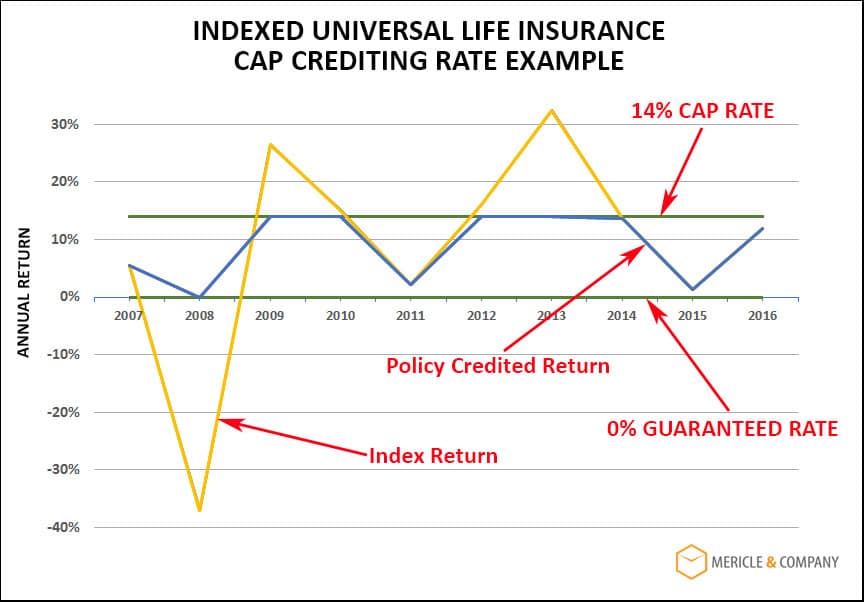All Categories
Featured
Table of Contents
Indexed Universal Life (IUL) insurance is a sort of long-term life insurance policy plan that combines the features of standard global life insurance with the capacity for money worth growth linked to the performance of a stock exchange index, such as the S&P 500 (Flexible premium IUL). Like other types of long-term life insurance coverage, IUL gives a survivor benefit that pays to the recipients when the insured passes away
Cash value build-up: A part of the costs repayments goes right into a cash worth account, which gains interest in time. This cash value can be accessed or borrowed against during the policyholder's lifetime. Indexing choice: IUL policies use the chance for cash worth growth based upon the efficiency of a stock exchange index.
Can I get Indexed Universal Life For Wealth Building online?
As with all life insurance policy items, there is also a collection of risks that insurance holders need to recognize before considering this kind of plan: Market danger: Among the key threats linked with IUL is market danger. Because the cash value growth is linked to the efficiency of a securities market index, if the index executes poorly, the cash money value may not grow as anticipated.

Adequate liquidity: Insurance policy holders must have a steady monetary situation and fit with the superior payment demands of the IUL policy. IUL enables flexible premium repayments within certain restrictions, however it's necessary to maintain the policy to ensure it achieves its designated objectives. Passion in life insurance coverage: Individuals that require life insurance coverage and an interest in cash money worth growth might find IUL enticing.
Candidates for IUL need to be able to understand the mechanics of the policy. IUL may not be the finest alternative for people with a high tolerance for market threat, those that focus on inexpensive investments, or those with more instant financial requirements. Consulting with a certified economic expert who can give customized assistance is necessary prior to thinking about an IUL plan.
All registrants will certainly get a calendar invitation and web link to join the webinar by means of Zoom. Can not make it live? Register anyhow and we'll send you a recording of the discussion the following day.
Iul Insurance
You can underpay or skip premiums, plus you may be able to readjust your death benefit.
Cash worth, along with possible growth of that worth via an equity index account. An alternative to designate part of the money worth to a set interest option.
Policyholders can decide the percentage assigned to the taken care of and indexed accounts. The worth of the selected index is taped at the beginning of the month and contrasted with the worth at the end of the month. If the index enhances throughout the month, rate of interest is added to the money worth.
The 6% is increased by the cash money value. The resulting passion is included in the money worth. Some policies calculate the index obtains as the sum of the modifications through, while other plans take an average of the day-to-day gains for a month. No interest is attributed to the cash money account if the index decreases rather of up.
What is the difference between Indexed Universal Life Companies and other options?
The rate is established by the insurance policy business and can be anywhere from 25% to greater than 100%. (The insurer can also transform the take part price over the lifetime of the policy.) If the gain is 6%, the engagement rate is 50%, and the existing money worth total amount is $10,000, $300 is added to the cash money value (6% x 50% x $10,000 = $300).
There are a variety of benefits and drawbacks to think about prior to purchasing an IUL policy.: Just like typical universal life insurance policy, the insurance holder can enhance their premiums or lower them in times of hardship.: Amounts credited to the cash worth expand tax-deferred. The cash value can pay the insurance coverage costs, allowing the insurance policy holder to lower or stop making out-of-pocket premium settlements.
How do I compare Indexed Universal Life For Retirement Income plans?
Lots of IUL plans have a later maturity day than various other kinds of universal life plans, with some ending when the insured reaches age 121 or more. If the insured is still active back then, policies pay out the death advantage (however not generally the cash money worth) and the earnings may be taxed.

: Smaller sized plan stated value do not use much benefit over routine UL insurance policy policies.: If the index goes down, no interest is attributed to the cash money worth. (Some plans provide a reduced assured price over a longer duration.) Other financial investment cars use market indexes as a benchmark for performance.
With IUL, the goal is to benefit from upward movements in the index.: Since the insurance provider just acquires options in an index, you're not directly purchased stocks, so you don't profit when business pay rewards to shareholders.: Insurers charge fees for handling your cash, which can drain pipes cash worth.
Where can I find Guaranteed Interest Iul?

For most individuals, no, IUL isn't better than a 401(k) - Tax-advantaged Indexed Universal Life in regards to saving for retired life. The majority of IULs are best for high-net-worth people seeking methods to lower their gross income or those who have actually maxed out their other retirement options. For every person else, a 401(k) is a better investment lorry because it doesn't lug the high fees and premiums of an IUL, plus there is no cap on the quantity you might gain (unlike with an IUL plan)
While you might not lose any cash in the account if the index decreases, you won't earn rate of interest. If the marketplace transforms favorable, the earnings on your IUL will not be as high as a typical investment account. The high expense of costs and charges makes IULs expensive and significantly much less economical than term life.
Indexed universal life (IUL) insurance coverage uses cash worth plus a death benefit. The cash in the cash worth account can gain interest via tracking an equity index, and with some usually assigned to a fixed-rate account. Nonetheless, Indexed global life plans cap exactly how much money you can build up (typically at much less than 100%) and they are based on a possibly volatile equity index.
How can Indexed Universal Life Protection Plan protect my family?
A 401(k) is a better option for that objective due to the fact that it doesn't bring the high costs and premiums of an IUL policy, plus there is no cap on the amount you might gain when spent. A lot of IUL plans are best for high-net-worth individuals seeking to reduce their taxed earnings. Investopedia does not give tax, financial investment, or financial services and advice.
If you're taking into consideration purchasing an indexed universal life policy, initial talk to a financial advisor that can explain the nuances and offer you an exact image of the real capacity of an IUL policy. Make certain you recognize just how the insurer will certainly calculate your rate of interest, incomes cap, and costs that may be assessed.
Latest Posts
Universal Life Insurance Expires When
Universal Term Life Insurance
Financial Foundation Iul